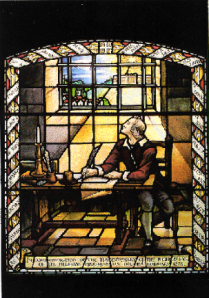For more information, see also our Chronology and Bibliography.
John Bunyan is known throughout the world as the author of The Pilgrim’s Progress, one of the greatest classics in the English language. First published in 1678, with a second part added in 1684, this amazing book has never been out of print.

So who was John Bunyan, and why has his book become such a classic? He was born in Elstow, just outside Bedford, and lived from 1628 to 1688 – a period of momentous political, social and religious change in England. In 1642 while he was still a boy, tensions between King Charles I and Parliament erupted into a bloody Civil War which ended with the defeat and execution of the king, and the establishment of a republic under Oliver Cromwell. Even though the monarchy was restored in 1660, things could never be the same again. England was transformed from a country where the King aspired to absolute rule, and the Church of England was the only authorised place of public worship, to one where Parliament had gained political power and where, eventually – thanks in large part to the heroic witness of people like Bunyan – Nonconformists were allowed to worship freely.
Bunyan served as a soldier in the Parliamentary army towards the end of the Civil War. His most important intellectual development took place in the ferment of radical preaching and pamphleteering that characterised the English Revolution. Following a prolonged religious crisis in the early 1650s he experienced a religious conversion. He became a preacher, and began to publish sermons, theological treatises and poems. When King Charles II regained the throne in 1660, a determined attempt was made to suppress religious Nonconformists like Bunyan, who were perceived as a threat to social order. Parliament passed a law forbidding worship outside the established Church of England. Bunyan refused to give up preaching, and spent twelve years – one third of his adult life – locked up in Bedford gaol as a consequence.
During his time in prison he wrote The Pilgrim’s Progress. It is a book strongly marked by his experience of persecution and suffering. The central character, Christian, is warned from the outset of the trials and dangers he will have to undergo on his journey from the City of Destruction. His pilgrimage takes him through the Slough of Despond and the Valley of the Shadow of Death, and he has to contend with enemies like the fiendish Apollyon and Giant Despair. But with the help of his trusty companions, Faithful and Hopeful, he finally makes it to the Celestial City. The famous episode at Vanity Fair, where Faithful is put to death, dramatizes, in part, Bunyan’s own trial before the Bedfordshire magistrates. What comes across is the cultural isolation of the pilgrims, and their awareness that they are a minority battling for survival against the dominant forces of the day.
The Pilgrim’s Progress was a best-seller from the moment of its publication. Much of its attraction in English lies in the beauty and simplicity of Bunyan’s prose, and in the vividness with which he brings his allegorical characters to life, acutely catching the rhythms of colloquial speech. Its influence was profound, as any reader of nineteenth-century fiction will know. Maggie Tulliver, Adam Bede, Little Nell, Nicholas Nickleby, and Huckleberry Finn all read The Pilgrim’s Progress. Many other novels draw upon Bunyan in their structure, setting and thematic development – think of Jane Eyre, Oliver Twist, Vanity Fair, not to speak of books for children like Little Women or The Wizard of Oz. As it entered other cultures and societies in over 200 translations, it was adapted and appropriated for different purposes, and its meanings changed significantly. This is especially obvious in the illustrations, where, for example, we see Christian in the garb of a Samurai warrior, or leaving an African hut to set off on his journey. The narrative of a man on a quest for the truth is one with strong echoes in folk-tale, and it is not difficult to see how it was able to transcend national barriers to become a world book. The heroes of The Pilgrim’s Progress are ordinary people striving to hold on to their beliefs in a hostile and uncomprehending society. Their story continues to inspire the imagination of readers across the world.
W. R. Owens, University of Bedfordshire
